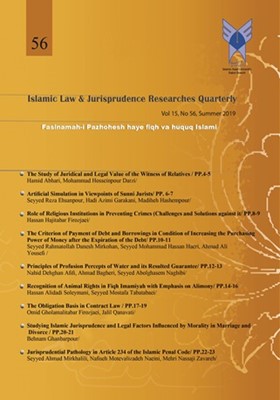Role of Religious Institutions in Preventing Crimes (Challenges and Solutions against it
Subject Areas : Private law
1 - Assistant Professor in Penal Law, Qaemshahr Branch, Islamic Azad University, Qaemshahr, Iran
Keywords: strategies, challenges, Crime Prevention, Religious organizations,
Abstract :
Today, in Islamic societies, especially in Iran, one of the most important social institutions for the promotion of Islamic culture is religious institutions. These institutions are molded in a society in the form of governmental and official organizations, as well as nongovernmental and popular ones. One of the main tasks of these institutions is to prevent crime through combating factors and processes, or situations and circumstances that are effective in the occurrence of crime and social abnormalities, by direct sampling of the teachings of the Islamic religion (Holy Quran and the Infallible Sunnah (AS)). Therefore, religious institutions can play a significant role in providing the moral and social prosperity of a society by drying up the roots, factors and situations that have an impact on crime, while Iran's lawmaker is also subject to various laws and regulations, including in Article 106 of the fourth economic, social and cultural development act of 2004 which approved the role of religious institutions. But nevertheless, these institutions have faced a number of legal and practical barriers and challenges to address this challenge and obstacles, and to provide the necessary and appropriate solutions. To confront them, it is more and more felt that these challenges and strategies have been addressed in this paper.
نیازپور، امیر حسن، (1385)، اقدامهای دستگاههای دولتی ایران در زمینه پیشگیری از بزهکاری، مجله تخصصی الهیات و حقوق، شماره 20.
_||_Alizadeh, M. (2003). The role of Islam in prevention and reduction of delinquency (1st ed.). Mashhad: Razavi University of Medical SciencesPublication.
Anvari, H. (2007). The great culture of speech (4th ed.). Tehran: Sokhan Publication.
Ardebili, M. (2004). Prevention of crime in the current Iranian law. Journal of Legal Justice, 12, 49-48.
Asghari, A., Sarmadi, A. (2012). Crime prevention in the law of the fifth development plan. Journal of Criminal Law Sciences, 4, 11-20.
Ebrahimi, Sh, (2011). Crime prevention (1st ed.). Tehran: Mizan Publications .
Ebrahimzadeh, A. (2004). Religious research. Tehran: Tahsezin Publishing House.
Iranshahi, H. (2011). Crime prevention and the role of responsible organizations in Iranian law (2nd ed.). Tehran: Publishing House.
Mansour, A., Ebrahimi, S. (2008). Transformations in crime. Journal of Preventive Medicine, 8, 25-35.
Mirmohammad, H. (2002). Remedies on crime prevention. Journal of Legal Research, 5, 36-35.
Nispour, A. (2006). The actions of Iranian government agencies in the field of prevention of delinquency. Theology and Law, 20, 55-65.
Purzal, Y. (2006). Religious teachings and its role in crime prevention. Chalous: Chalous Publication.
Sadooq, M. (2007. Man La Yahzaya Al-Faqih (1st ed.). Qom: Al-Modaresin Publication.
Saffari, A. (2001). Theoretical foundations of crime prevention. Journal of Legal Research, 2, 24-33.
Saffari, A. (2010). Transformation of crime prevention and its importance. Journal of Legal Research, 52, 72-84.
Salehi, J and Sadeghi, E. (2011). Islamic teachings on the prevention of delinquency. Cultural Engineering, 61, 20-35.
Tabataba'i, S. (2010). Al-Mizan Al-Tafsir Al-Quran. Qom:Islamic Publication Office.

